Amid Prolonged Despair, A West Virginian Rallies Rednecks Against Good Ol’ Boys
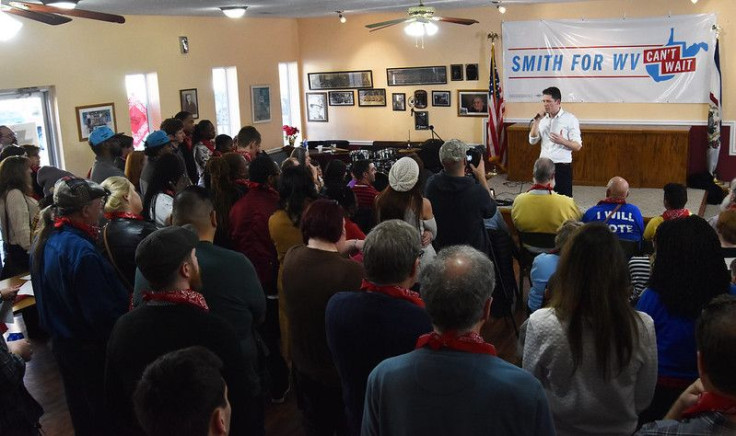
In the early throes of the coronavirus pandemic, West Virginia found itself gaining unexpected national attention. In early March, Seattle was the COVID-19 epicenter but it wasn’t until March 17 that West Virginia became the last state to report a confirmed case of the coronavirus.
The state managed to avoid the coronavirus, not because West Virginians were collectively superior at social distancing, but because the state was so behind in testing. It wasn’t until March 7 that tests were conducted. Within a week, just 12 people were tested in West Virginia.
It was also on March 17 that President Trump publicly lobbed compliments at West Virginia. Trump, who at the time seemed to downplay the coronavirus, appeared to be playing politics with his kind words, praising West Virginia and its Republican governor while in the same breath throwing jabs at California and New York, two states with Democratic governors.
“We’re not going to need [equipment] in West Virginia, where so far, I guess they have [no cases],” Trump said, before praising West Virginia Gov. Jim Justice.
“Big Jim, the governor, he must be doing a good job of that,” Trump said. “That’s what’s reported … West Virginia is the only one that has no cases. So obviously that’s being treated differently than a New York or California.”
Justice was doing his own part to downplay the coronavirus just one day before Trump’s comments.
"For crying out loud … If you want to go to [restaurant chain] Bob Evans and eat, go to Bob Evans and eat,” he said on March 16.
His comments immediately drew criticism from even state Republican lawmakers and within a day West Virginia reported its first confirmed case of COVID-19. By March 31, West Virginia had 162 confirmed coronavirus cases and its first reported death. By May 1, there were 1,125 cases and 44 deaths. By June 1, there were 2,010 cases and 75 deaths.
After the Justice and Trump comments, Sen. Joe Manchin, D-W.V., quickly sounded the alarm in an interview with CNN.
"I wanted to make sure that people understood they should not get a false sense of security. I was hoping the president would not go down that road in making [it] look like we're doing something special," Manchin said on March 18.
“We have no testing. We're not prepared. People think that we're immune from this."
Manchin, who is not known for hyperbole, made no effort to sugarcoat the situation.
"When it hits my state — and it has hit — it is going to be absolutely catastrophic,” he said.
Manchin’s comments were backed by evidence, as a Kaiser Family Foundation study found that West Virginia had the nation’s highest percentage of adults (49.3%) at risk of developing serious illnesses from the virus. That figure was particularly ominous when considering that 20% of West Virginia’s population is 65 or older. Making matters worse, two hospitals were shutting down in the state, a serious problem when considering few areas in the U.S. are as rural as West Virginia.
If there was any time that West Virginia could get a boost of hope or leadership it would be now.
Ask West Virginia community organizer Stephen Smith about the plight of his state and he will immediately tell you that there is no white knight who will come to the rescue, and after decades of struggles, West Virginians seem to be growing more impatient about the barrage of problems. In fact, Smith has built a grassroots movement — it’s aptly named “West Virginia Can’t Wait” — predicated on the belief that one person can’t change things and that change is needed immediately.
Never heard of Smith? You’re not alone. There are 92 “Stephen Smiths” or “Steven Smiths” listed on Wikipedia and not one of them is the aforementioned Stephen Smith of West Virginia.
But what Smith may lack in name recognition he attempts to make up for in determination and pragmatism.
He also happens to be running perhaps the most fascinating gubernatorial campaign in the country.
Mounting Problems In The Mountain State
Before the coronavirus hit West Virginia, the state was battling an opioid epidemic, discouraging employment trends, depleting national demand for coal, and an educated class that is quick to bolt to other states, among other issues.
The household income and employment statistics are daunting to say the least. According to figures from 2018, West Virginia’s median household income of $44,097 was 28.2% lower than the national median household income of $61,937. The 2018 figures also show that West Virginia had the fourth-highest poverty rate, 16.5%, which was nearly 40% higher than the national poverty rate of 11.8%. In February, before the impact of coronavirus was felt on the economy, the national unemployment rate was 3.5%, while West Virginia’s unemployment rate was 40% higher at 4.9%.
Prosperous metro areas are often crucial to a state’s economy, which poses a big challenge for mostly rural West Virginia. The state’s most populated city is its capital, Charleston, which is estimated to have a little more than 47,200 people. Charleston is slightly ahead of Huntington, which has a population of over 46,000. Morgantown is the third-most populated city in the state at about 31,000 people. The consequences of being so rural may slow West Virginia’s prospects to truly build a 21st-century economy. According to the Federal Communications Commission, a third of the state doesn’t have the internet.
West Virginia has seen its population decrease since 2010, from 1.85 million to 1.79 million. Only three other states are estimated to have lost population in the past decade: Illinois, Connecticut and Vermont.
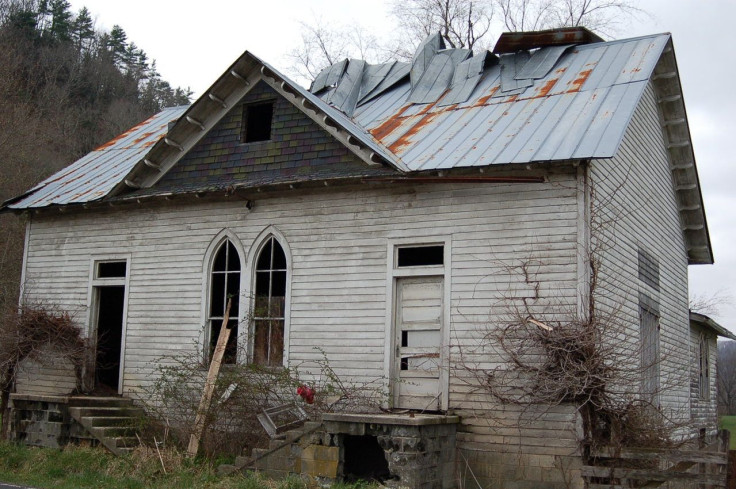
Part of the reason for the population shrinkage is the opioid epidemic. Many states have found themselves paralyzed by the crisis but it’s been particularly arduous for West Virginia, which has among the highest opioid death rates in the country.
West Virginia had 702 drug-overdose deaths from opioids in 2018 after 833 deaths in 2017. When comparing West Virginia to Idaho and Nebraska — two states with similar populations — the overdose figures are more glaring. In 2018, Idaho had 120 drug-overdose deaths from opioids while Nebraska had 63, which means West Virginia had 383% more overdose deaths than Idaho and Nebraska combined.
Though West Virginia has failed to effectively tackle the opioid epidemic, the same can be said for Maryland, Massachusetts, New Hampshire and Ohio, and many other states in what is a growing national problem.
But what can’t be said about many other states and can, in fact, be said about West Virginia, is that there is an overall health crisis. West Virginia has a higher percentage of people affected by diabetes, heart disease and obesity than the rest of the nation. According to the National Center for Health Statistics, West Virginia consistently has one of the highest annual suicide rates in the country, which is particularly troubling considering the national suicide rate has surged 35% in the past two decades.
Then there’s coal. West Virginia has long been synonymous with the antiquated nonrenewable energy source. For over 200 years, West Virginia has relied on coal mining. In the late 1940s, more than 125,000 West Virginians had jobs in coal mines.
The coal industry has been in a highly noticeable and steady decline for quite some time, as natural gas has proved to be a cheaper energy source. Appearing on CNBC in 2015, Jim Stewart of the New York Times pointed out how coal companies have been buried by Wall Street investors. “Ironically, it’s the market that has done this [to the coal industry]. It’s really not Washington. It’s not the activists. It’s not the environmentalists marching around out there … it’s cheap natural gas,” Stewart said.
Yet, there are still some West Virginians holding out hope that coal could make a comeback despite the environmental concerns and after Trump in 2019 vowed to rescue the industry.
“Coal in the U.S. might not be dead, but it is in a death spiral,” Alex Gilbert, of the energy research firm SparkLibrary, told environmental website Grist.org in January 2018. “Coal’s demise is inevitable, but it can still emit significant greenhouse gas and other emissions on its way out. The main policy question now is whether the death spiral should be a decade long or decades long.”
Meanwhile, the coronavirus has caused businesses to shutter, which means less dependence on energy and therefore another blow to coal and West Virginia.
The dying coal industry means more job loss for the state but there may not be too many tears shed. For many older West Virginians, hearing about how weaker demand for coal is causing more joblessness sounds like a broken record.
From 1983 through 1985, West Virginia had the highest unemployment rate in the nation. In 1986, Gov. Arch A. Moore Jr. struck a familiar refrain when he told the New York Times that, ''the challenge now, of course, is to shift away from the reliance on coal'' as a jobs generator. In 1985, there were 38,000 jobs in West Virginia coal mines. By 2018, there were just under 14,000 coal-mining jobs.
Many have been saying that it may be finally time for West Virginia to give up on coal.
James Van Nostrand, a law professor at West Virginia University in Morgantown and author of an upcoming book, “Coal Trap: How West Virginia was Left Behind in the Clean Energy Revolution,” calls the energy industry developments in Central Appalachia from 2009 to 2019 “the lost decade.”
“It is pure folly to think that West Virginians can save the coal industry,” Van Nostrand told International Business Times.
Catering to West Virginia’s coal industry has proved costly. “Our utilities offer 92% coal-fired electricity at rates that have increased faster than in any other state in the country over the past decade,” Van Nostrand said.
So with coal phased out, what’s the answer to getting West Virginia back on track?
A game changer was thought to be in the works in 2017 with a natural gas deal between the Trump administration and China.
Roughly $84 billion of the $250 billion that China’s largest state-owned energy provider was planning on sending to the U.S. was slated to go to West Virginia for shale gas and chemical projects over 20 years. The governor and other state officials were quick to count their blessings.
“Really and truly, it’s a-coming,” said Justice.
The deal turned out to be an empty promise. The $84 billion has yet to show up and with U.S.-China relations marred by a trade war and blame-slinging over the coronavirus pandemic, it’s unclear if West Virginia will see that windfall anytime soon or ever.
The $84 billion in natural gas projects may have been a farce to begin with. In June 2019, CNBC’s Kayla Tausche interviewed Dennis Xander, president of West Virginia-based Denex Petroleum. Xander was adamant that West Virginia doesn’t have the resources, even over 20 years, to get such a deal done.
It seems that the empty promises of a “comeback” for coal may now be replaced by years of waiting for major natural gas deals.
While West Virginia struggles to build a stronger economy, it’s been severely weakened by the coronavirus.
Heather Stephens, an assistant professor of Resource Economics and Management at West Virginia University, noted on a university website that about 13% of the state’s jobs — leisure, hospitality, oil and gas — fall under what the Brookings Institute and Moody’s have classified as “highly vulnerable.”
A State Of Misconceptions
In most of the country, the terms “redneck” and “good ol’ boy” have straight-forward meanings. To some in the Mountain State, those terms take on very different connotations.
Americans will often use “redneck” as a derogatory term for a crass, uneducated working-class white person from the South. But there are West Virginians who use the moniker in solidarity and pride after black, white and immigrant coal miners fought together with red bandanas against coal companies in the 1912-21 West Virginia Mine Wars.
People might think of a “good ol’ boy” as an unsophisticated, intolerant but outgoing white male, usually found in small towns in the South. The phrase conjures the "Theme from The Dukes of Hazzard (Good Ol' Boys)" from the popular 1980s television show and sung by country music star Waylon Jennings, with its opening lyrics, “Just the good ol’ boys/Never meanin’ no harm.”
Lately in West Virginia, the good ol’ boy network is thought to do a lot of harm as the term has been redefined as a crony political network that mostly consists of rich, white men. Those good ol’ boys can include Justice, as well as many others who seem to be thriving — politically or financially — in a state that has been marred by stagnation.
But there’s more to misconceptions of West Virginia than just nomenclature.
Images of dusty coal mines in a blue collar state might hide the fact that few parts of the U.S. have as much breathtaking natural beauty.
The state’s landscape could have some thinking that West Virginia is one of the country’s best untapped regions. In recent years, Americans who felt outpriced in big cities like New York, Los Angeles and San Francisco found themselves flocking to cities like Austin, Texas, as well as Nashville, Tennessee, and Charleston, South Carolina. Some might wonder if one day West Virginia might be a permanent destination for those who want to ditch city life to camp occasionally at Monongahela National Forest, or feel the thrill of a drive across New River Gorge Bridge or enjoy a hike along the Endless Wall Trail.
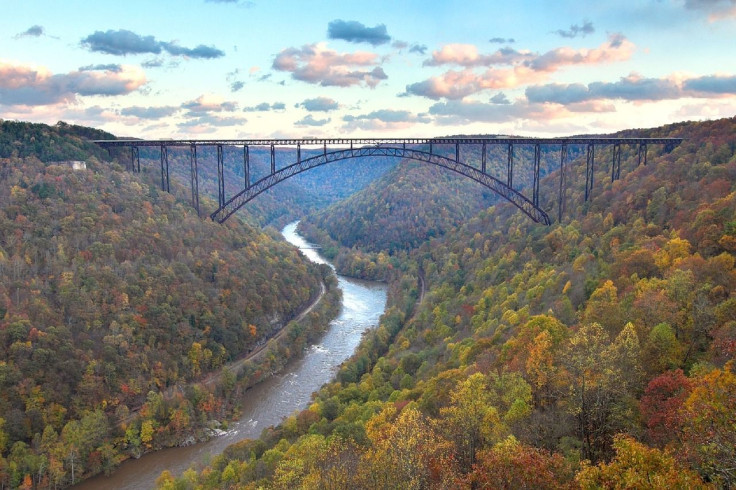
The state also has a surplus of pride, a commodity that one might have assumed had fled its borders like the many graduate students from West Virginia University and other colleges.
Few states can boast a song that hits closer to the heart than John Denver’s “Take Me Home, Country Roads.” The song’s lyrics read: “All my memories gather 'round her/Miner's lady, stranger to blue water/Dark and dusty, painted on the sky/Misty taste of moonshine, teardrop in my eye.”
West Virginian pride got some attention in 2017 with the release of the heist comedy film, “Logan Lucky.” The acclaimed film directed by Steven Soderbergh served up a heavy dose of twang in the Appalachian accents, as well as an impromptu rendition of “Take Me Home, Country Roads.”
Despite all the despair, West Virginia hasn’t given up its fighting spirit, which was in plain view in February 2018 during a massive teachers strike. The strike over salary and benefits sparked a movement that found its way to Arizona, Colorado, Kentucky, North Carolina and Oklahoma, as well as Los Angeles and Oakland, California.
The strike was technically illegal in West Virginia, but that didn’t stop energized teachers, who found themselves marching in solidarity with students. In the end, the teachers got a 5% pay increase, a solid bump from the proposed 1% and 2% increases.
Indeed, while many West Virginians have fled the state, those who have stuck around aren’t ready to wave the white flag.
In a nearly 7-minute op-doc video for the New York Times in 2013 entitled “West Virginia, Still Home,” producer Elaine McMillion Sheldon, a native of Logan County, touched on nearby McDowell County, which has seen far more people leaving than staying. There were 98,887 people in the once-wealthy coal-rich county in 1950 but by 2010 there were 22,113, with nearly a third below the poverty line. Yet, lifelong residents haven’t given up on their hard-hit community.
“It’s my home. I love these mountains,” bluegrass musician Alan Johnston says in the documentary. “I wouldn’t never be satisfied anywhere else … home is where my heart is. And my heart is right here in McDowell County.”
Nostalgia for the days of once-prosperous West Virginia is probably getting counter-productive. Longtime educator and former civic leader Ellis Ray Williams stressed the need for West Virginia to look forward.
“To get people back, we’re going to have to have different emphases to employ the people and we’re going to have to keep up with the changing world,” Williams said in the documentary.
It’s all these contradictions, and perhaps the myth that West Virginia is a hotbed for conservative policies, that presents an opportunity for someone like Smith.
A look at Smith’s upbringing and background may provide some hints as to the type of state West Virginia might become if he wins the Democratic nomination on Tuesday and the state’s general election in November.
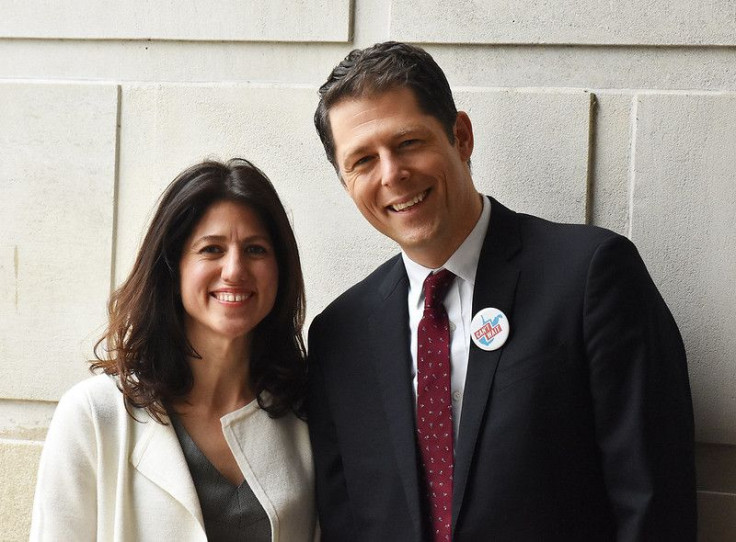
The Man Who Returned To His Roots
Stephen Noble Smith in some ways personifies the contradictions of West Virginia. While outsiders might think West Virginia is a state where nobody sticks around, Smith found his way back and hasn’t left. His story seems less "The Prodigal Son" and more "Welcome Back, Kotter."
Smith, 40, was born in Charleston to parents who likely ingrained the importance of fighting for social causes. Smith's mother, Jane Smith, has been described as someone who would always open her home to those in need, while Smith's father, Mark Smith, worked in nonprofits.
The family moved to the Dallas suburb of Plano when Smith was 9 years old. Smith would go on to graduate from Plano Senior High School. He would later leave the Dallas area for Boston where he would graduate from Harvard with a sociology degree.
Smith made his presence felt at Harvard. As a member of the Coalition Against Sexual Violence, Smith wrote an article for the Harvard Crimson in October 2000 about, "Harvard's abysmally sub-par rape prevention and rape survivor services." Before he turned 20, he was part of the Progressive Student Labor Movement, which sought a living wage for university employees.
"For the last year we've been embarrassing the administration, for the last year we've been rallying student support, for the last year we've been talking to union members — we're here today to tell Harvard that we won't quit," Smith told the Crimson in October 1999.
After graduating in 2002, Smith found himself in Botswana where he served as a field organizer for an AIDS organization. In Chicago, he worked as an immigration rights organizer.
It was at a 2003 anti-war rally in Chicago where he met his future wife Sara N. Whitaker. According to the New York Times, Whitaker had asked Smith about what he wanted to be when he grew up. Smith responded: "I want to be a dad."
In June 2007, they were married.
The couple would then move to England where Smith earned a master's degree in comparative politics from the London School of Economics.
After London, they had plenty of big-city options to put down roots in the United States. The couple shared Chicago in common — Whitaker graduated from Northwestern and Smith worked in social advocacy organizations — and Whitaker was from Los Angeles while Smith had lived in Boston and Dallas.
Instead, they were drawn to Smith’s birthplace of Charleston.
Smith had returned to where he started. He also fulfilled the ambition that he revealed to Whitaker at the anti-war rally. The couple now have an 8-year-old son.
Whitaker, who previously worked at a sports and events marketing firm, now works as a public defender in Kanawha County.
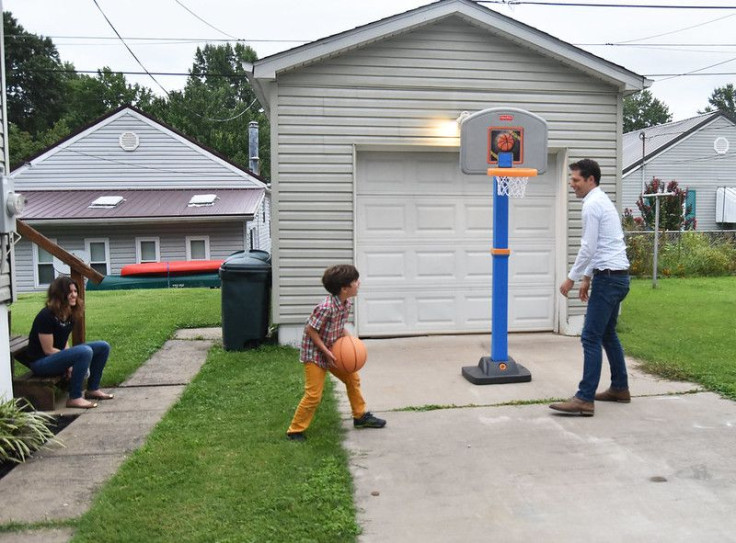
Smith picked up where he left off in Cambridge, working for social causes while surrounding himself with people who share his mission.
“The people of West Virginia are really good at taking care of each other,” Smith said.
In 2012, he became executive director of the nonprofit West Virginia Healthy Kids and Families Coalition. It was there that he helped lead the Try This campaign to improve public health. In 2014, he helped prevent then-Gov. Earl Ray Tomblin from cutting $1 million in family and child service programs.
Smith built Our Children, Our Future, a campaign of over 150 organizations seeking to end child poverty. The campaign helped raise the minimum wage and expanded school breakfast and lunch programs. Being part of a successful anti-poverty campaign like Our Children, Our Future may have been what pushed Smith to run for governor.
Smith may have also been inspired to seek his first public-sector job after witnessing first hand how the government fell short during a crisis. When southeastern West Virginia was ravaged by a deadly flood in June 2016, there was hope that the RISE West Virginia program, which had $149 million in community block grant monies to repair damaged homes or build new ones, would come to the rescue. Instead, the West Virginia National Guard would later be placed in charge of the program after just 51 homes — nearly all of them mobile homes — had been completed by July 2019 out of hundreds of applicants.
Smith said nonprofit coalitions helped build over 100 homes.
“There were essentially two responses to the flood. There was a federally funded, government response, where they had [$147 million] from the Feds to spend—and they still haven’t spent most of it four years later,” Smith told the New Yorker. “Meanwhile, there was a parallel response, led by local community groups and volunteers. The community response built more homes, and faster.”
When Smith hasn't been pounding the pavement for social causes, he has gotten his message out through writing. In September 2009, he published, "Stoking the Fire of Democracy: Our Generation's Introduction to Grassroots Organizing."
"This book is so honest and personal ... it's about community organizing, but really, it's about trying and failing and learning and succeeding," read one review on Amazon.com. The reviewer also described the book as “incredibly inspiring.”
In April 2017, Smith co-wrote an article in the Charleston Gazette-Mail under the headline, "WV is Best Place for Millennials, Who Want to Change the World," after WalletHub called the state the worst place to live for millennials. In the article, Smith appears to reflect on his own mission, describing West Virginia as "a humble place where you can make a difference, raise a family, and find a real community."
Building a stronger sense of community has always seemed crucial to Smith. There is a constant push from the West Virginia Can’t Wait movement to interact with residents and a glance around social media and local news reports finds Smith’s name constantly popping up.
After over 20 years of leading grassroots efforts for social change, Smith says West Virginia can’t wait any longer. So he’s running for governor.
A Growing Trend In Politics
Much like how Democratic candidates in the 1980s and 1990s seemed to emulate the speaking style and mannerisms of John and Robert Kennedy, this new generation of Democrats appears to be taking its cues from Barack Obama’s infectious optimism.
Like Obama, the inflection of Smith’s voice on the campaign trail is often brimming with hope and idealism. He fervently avoids politician-speak phrases like, “When I am elected governor...,” or talking in the third person to draw more attention to his campaign like, “Stephen Smith believes in…” Instead, there is a priority placed on “we.” Listening to Smith in interviews, one might draw the conclusion that he has some type of phobia of personal pronouns.
Smith may be taking it a step further — at least by West Virginia standards — than Democrats like Robert “Beto” O’Rourke of Texas and Stacey Abrams of Georgia, two candidates who ran energized, underdog campaigns in red states in 2018 while borrowing from Obama’s determined style.
He has used his “West Virginia Can’t Wait” movement to mobilize volunteers. Smith told IBT that he has over 11,000 donors but it’s his “captains” who are making their mark on the campaign.
“County captains have been responsible for organizing town halls and visits to union halls, shelters, recovery programs and small businesses. [They are also] organizing local voter registration, door-knocking, service projects, managing local Facebook groups, recruiting local fundraiser hosts, organizing the voter survey outreach, holding policy ‘platform parties’ to gather feedback on our process, organizing sign and material distribution, helping with local press and editorials, recruiting and supporting local candidates on our slate,” Smith said in an email.
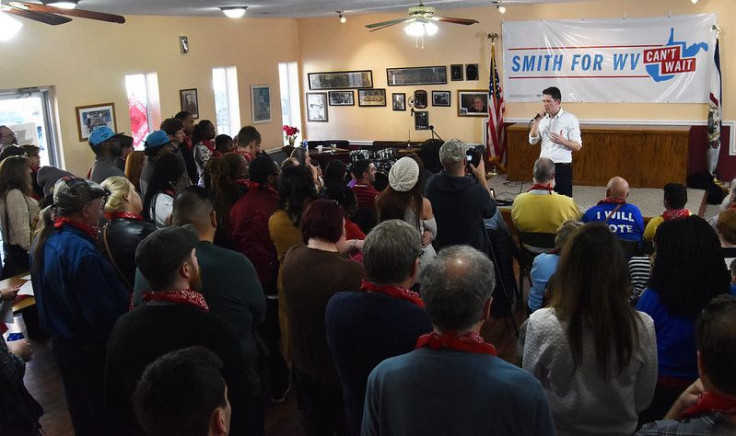
“Constituency captains — Veterans Can't Wait, Seniors Can't Wait, Educators Can't Wait, among others — have been responsible for much of the same as the county captains. They also have had even more interaction in the creation of our policy platform.”
Smith says there are roughly 230 county captains and about 85 constituency captains. And there is solidarity in the movement.
“We were the first campaign in West Virginia history to have a unionized staff. We are the first campaign for governor in West Virginia history to reject donations from corporate PACs and corporate lobbyists,” said Smith.
“More important than anything else, we have recruited, trained, and supported over 90 other down-ballot candidates to also run for office -- veterans, educators, students, drivers, and other West Virginians who are not usually represented in government,” he added.
According to the official website, West Virginia Can’t Wait candidates take a pledge not to accept corporate cash or PAC money, never to cross a picket line, to talk with the public and never to hide from a debate, and “never [to] punch down” by fighting among each other. The Facebook page for West Virginia Can't Wait has a large banner that reads "Not for Sale."
The campaign has already set records.“We broke Joe Manchin's record for most individual donations ever in a governor's race, and those donations come from working people. We have 60 times as many donations from educators as all of our top opponents, combined," Smith said.
Albeit in defeat, progressive populists O’Rourke and Abrams seemed to have awoken a spirit in 2018 among Democrats that states that were once considered hopeless can at least be competitive. Their campaigns followed Democrat Sen. Doug Jones’ special election victory in December 2017 in reliably red Alabama, as well as Democrats like Sen. Kyrsten Sinema of Arizona and Kansas Gov. Laura Kelly, who both earned tight red-state wins in November 2018.
Though many other Democrats and Republicans are running unique and spirited campaigns, Smith is one of the few who has been called out by some big names.
In September, Sen. Elizabeth Warren of Massachusetts endorsed Smith on social media during her bid for the Democratic nomination.
“Stephen Smith is building a people-powered movement to take back the power from corporate executives, lobbyists, and politicians who put their own interests ahead of everyone else. West Virginia can't wait any longer for big, structural change. I'm proud to endorse WV Can't Wait for Governor of West Virginia!” Warren’s message read.
He has also been the subject of several national profiles, which include a recent article by Evan Osnos in the New Yorker. In 2018, Smith was named West Virginia Person of the Year by WV Living.
On social media, Smith has 36% more Facebook followers than both of his Democratic opponents combined. He also has twice as many Twitter followers as his main Democratic challenger. However, Justice towers over all the Democrats on social media, likely due to his big-budget campaign and the benefits of incumbency.
Campaigning In The Coronavirus Climate
The COVID-19 pandemic has caused a major disruption for campaigns, with candidates getting their message across to the public from their homes through video messages. The days of stump speeches, conversing at town halls, kissing babies and shaking dozens of hands, are mostly over in 2020.
During the health crisis, Smith turned his message of volunteerism into action.
“We turned our field operation into a COVID-19 crisis response team,” said Smith. “We've trained and supplied 369 of our campaign volunteers to check-in on over 36,000 of their neighbors every week, to make sure folks have the food, medicine, and everything else they need to stay safe.”
Much like the response to the 2016 flood, the government was slow to act.
“We were proud to put up a comprehensive coronavirus resource website before the State of West Virginia,” he said. “When the governor was still telling people to go eat at Bob Evans, we had a full response platform up.”
Smith may be hoping he can siphon some support from Justice when it comes to the coronavirus response after the infamous Bob Evans comments. Whether the statement will come back to haunt Justice is anyone’s guess. Yet after several weeks, Justice has received plaudits for how he’s handling the health crisis and even earned some praise from Manchin.
“What I’m very appreciative about what Jim Justice is doing — and I’ve said this openly and publicly — is he’s paying attention to [state coronavirus czar Dr.] Clay Marsh and some of the professionals, which the president is not doing,” Manchin told West Virginia MetroNews Network.
Justice told Forbes that “the Trump people have done a magnificent job” in handling the pandemic. Most national polls show that Trump has fared poorly in his response to the coronavirus.
While it’s unclear how much of an impact the coronavirus will have on the election, the crisis seems to have provided a spark to the West Virginia Can’t Wait campaign as Smith continues to channel his grassroots organizing skills to help the state.
“We're organizing an average of 11 online town halls and Facebook Live broadcasts each week to reach voters and interview frontline workers about their experiences,” said Smith.
“It's a pretty incredible thing.”
Two Very Different Candidates
There are more differences between Smith and Justice than just their responses to the pandemic.
In March 2019, Justice vetoed a bill that would encourage medical marijuana businesses to come to West Virginia. Smith has taken a far different approach to cannabis, following the lead of a growing number of states.
“We are the only major party campaign to favor cannabis legalization,” Smith said.
Smith offers a plan that he says would “decriminalize, legalize, and make sure that the wealth created by the industry stays in the hands of West Virginia farmers and small businesses, not out-of-state corporations.”
He makes the case that his cannabis plans will be far-reaching, helping “veterans and cancer patients get the treatment they need; farmers and small businesses get valuable new revenue; and schools and treatment centers get extra revenue to function. Also, the states [that] have legalized cannabis have also seen a drop in opioid overdose deaths.”
Smith also has plans for West Virginia that can be enacted on Day One. By using an executive order, Smith said he would create a Corporate Crime and Political Corruption division in the state police.
Smith’s plan comes amid a 2018 political scandal that saw state lawmakers impeach justices over expensive office renovations and later involved corruption, incompetence and neglect-of-duty allegations.
“The reason why corporate crime and political corruption run rampant is because no one is tasked to police it,” Smith said. “That will change when we take office.”
“I remember what Mother Jones said a hundred years ago: ‘I asked a man in prison once how he happened to be there and he said he had stolen a pair of shoes. I told him if he had stolen a railroad he would be a United States senator,’” said Smith.
Justice and Smith also show stark differences in tone and authenticity.
While Smith advocates for uniting the state through outreach, Justice made a galling political maneuver that put his credibility into question.
In August 2017, Justice announced he was switching parties. The announcement came during a Trump rally and with the president standing next to him. It was a move that caught even his staff off guard.
“Today, I will tell you as West Virginians, I can’t help you anymore being a Democrat governor,” Justice said in Huntington. “So tomorrow, I will be changing my registration to Republican.”
Justice, 69, an imposing man who has been listed at 6-foot-8 and about 370 pounds, inherited his father’s coal mining business, and then went on to own about 100 companies.
In a Forbes profile in April 2019, Justice was labeled a “deadbeat billionaire.” The governor agreed in early April to pay $5 million after he settled a U.S. Department of Justice civil complaint against 24 of his coal companies.
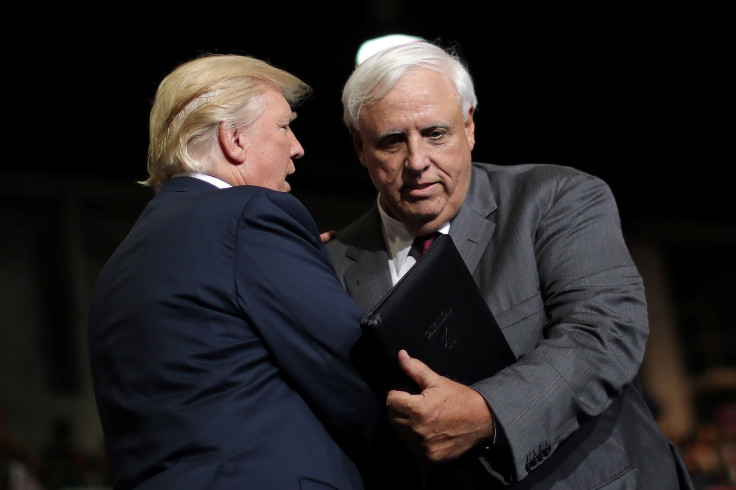
When asked if Justice had let down the state, Smith didn’t hold back, touching on a variety of topics.
“Yes, but most West Virginians aren't surprised,” Smith said. “The governor spent his whole life dodging taxes and fines, undercutting workers, and hurting small businesses. Of course, that is what he has continued to do in office. We see this in his abysmal response to the 2016 flood, his half-hearted response to [the] strike [by] teachers, and his support of a big fat bailout for coal operators in 2019, instead of funding a state Black Lung Pension Fund for miners.”
Much like his physical stature, Justice, the richest man in West Virginia, has a towering advantage in fundraising. His net worth is listed at $1.5 billion, which means if he is serious about remaining in office, he can simply open up his own wealth to self-fund his campaign.
But Smith has his large swath of donations and has raised nearly $900,000. It’s an impressive haul for someone new to politics.
“It will be very difficult for any candidate to defeat Jim Justice, who has the resources to spend whatever it takes to win,” said Van Nostrand, who has closely followed Smith’s campaign.
But Smith also has manpower, which might be the most valuable commodity on the campaign trail.
He said he has over 550 volunteers working a minimum of three hours a week for the West Virginia Can’t Wait movement. According to Smith, those volunteers include neighborhood captains, phone bankers, textbankers, postcard writers, online volunteers, fundraiser hosts, media volunteers, on-going county and constituency captain work.
West Virginia Ripe For A Democratic Rebirth?
Few states have flipped from one party to another as hastily and effectively as West Virginia. The turning point came nearly two decades ago in the presidential election.
Republicans entered the election after three consecutive landslide losses. But when the coal dust settled in 2000, it was Republican George W. Bush, who had once run an energy company, defeating Democrat Al Gore, an ardent environmentalist, by a margin of 51.9% to 45.6%. The five electoral votes from West Virginia would have been enough to carry Gore to the White House.
There has been no looking back for Republican presidential candidates since. Bush carried West Virginia with 56.1% of the vote in 2004, John McCain thumped Obama with 55.6% of the vote, and Mitt Romney followed with 62.3% of the vote. In 2016, Trump ran away with West Virginia with 68.5% of the vote — his strongest showing in any state.
But West Virginians are not averse to voting Democrat despite their big shift from blue to red in presidential elections. In 2016, they voted for then-Democrat Justice, who held off the more polished Bill Cole, a Republican with solid conservative credentials. Justice's victory marked the fifth-straight win for Democrats in a gubernatorial election.
For over 51 years, Democrat Sen. Robert Byrd served as West Virginia’s U.S. senator. Alongside Byrd in the senate was Democrat Jay Rockefeller, who represented West Virginia for 20 years. Manchin would fill Byrd’s seat in 2011 while Republican Shelley Moore Capito filled Rockefeller’s seat in 2014.
Rockefeller, the great-grandson of business tycoon John D. Rockefeller and the nephew of former Vice President Nelson Rockefeller, won the 2008 election in a landslide. In 2014, Capito defeated her Democratic opponent by a similar margin despite concerns from far-right groups that she was too liberal. Capito agreed with Manchin on 65% of their Senate votes in 2017 and 2018, according to ProPublica.
Like Rockefeller, Capito follows a legacy of her own, as the daughter of former Gov. Arch Moore. In November, she will likely face Democrat Richard Ojeda, a retired Army major who served in the West Virginia Senate.
West Virginia’s red status is less pronounced in its Legislature. The state Senate is composed of 20 Republicans and 14 Democrats, while the House has 58 Republicans, 41 Democrats and one independent. Those margins may mean that political winds could potentially blow from red to blue at any given election cycle as they had previously done from blue to red.
If it may seem premature to anoint Smith’s campaign as the state’s savior, well, it is. He still needs to get through Tuesday’s Democratic primary and Kanawha County Commissioner Ben Salango has the endorsement of both Manchin and the Charleston Gazette-Mail. Ron Stollings, a four-term state senator, is popular within his district.
In a Democratic debate in March with Salango and Stollings, Smith often looked flustered as he repeatedly looked over notes and kept reaching for his bottle of water while his lavalier was noticeably low on his tie. He also seemed nervous as he pivoted from policy questions to reference his campaign’s contact information.
The Democrat who comes out on top will likely face Justice in the general election, which isn’t expected to be a cakewalk. Voters may still be drawn to Justice’s businessman credentials, as they were in 2016, and as the economy remains a key issue.
Justice also continues to align himself with Trump, which may be a wise strategy given that the most recent Morning Consult state-by-state poll showed that West Virginia trailed only Alabama and Wyoming when it came to the highest net-approval ratings for Trump. A recent Civiqs poll showed Trump had a 64% approval rating in West Virginia.
Justice's adoration of Trump goes far beyond his public switch from Democrat to Republican. Justice spoke up Monday during Trump’s video teleconference with governors while protests raged throughout the country over the death of George Floyd.
“Mr. President, can you hear me? This is Jim Justice of West Virginia,” Justice could be heard saying. “All I would say to you is, if it comes to pass that some states would rather you didn’t come there, you come to West Virginia. Because you’re a blooming hero here, and we’ll protect you in every way, and there won’t be any disturbance whatsoever.”
Trump will be on the top of the ticket in November. In some ways, Smith could find himself competing in November against not just a good ol’ boy in Justice but the biggest good ol’ boy of them all in Trump.
Will West Virginia — saddled with problems but showing promise through a renewed spirit of solidarity — finally turn its back on wealth and political bloodlines like Rockefeller, Capito and Justice? Will this blue-collar state finally take a chance on a redneck campaigner like Smith?
There are clear indications that Smith will keep the movement going no matter the outcome.
As Smith said in an interview in 2019, “The people of West Virginia have actually been governing ourselves for the last 30 or 40 years, anyway.”
© Copyright IBTimes 2024. All rights reserved.






















